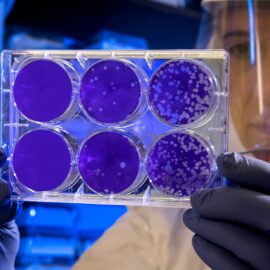

This article is an excerpt from the Shortform guide to "Huberman Lab". Shortform has the world's best summaries and analyses of books, podcasts, and more.
Like this article? Sign up for a free trial here.
What are the factors that impact men’s fertility? What’s the role of genetics in fertility?
On the Huberman Lab, Dr. Michael Eisenberg and Dr. Andrew Huberman look at the specific factors that affect male fertility. Just a few include testosterone, genetics, and age.
Keep reading to learn more about how doctors analyze a man’s fertility levels.
Evaluating Sperm Quality and Fertility
Dr. Eisenberg stressed the importance of analyzing sperm quality when assessing men’s fertility. In providing a comprehensive view of sperm health, he emphasized that it is not solely determined by the volume of semen.
Sperm health depends on factors like count, motility, and morphology. Notably, statistics reveal that approximately 15% of men have suboptimal semen quality, and about 1% of men may have no sperm at all in their ejaculate, a condition known as azoospermia. These figures underscore the widespread nature of fertility issues among men.
Impacts of Testosterone on Fertility and Reproductive Issues
The podcast delved into the physiological mechanisms by which testosterone levels are affected by lifestyle and environmental factors. Dr. Huberman introduced HCG as an option in conjunction with testosterone therapy to maintain sperm health for those trying to conceive.
Dr. Eisenberg concurred on the effectiveness of HCG, providing typical dosage guidance. Clomiphene was also discussed for its ability to possibly increase sperm and testosterone production by boosting FSH and LH levels.
However, Dr. Eisenberg cautioned that while clomiphene can impede estrogen’s effects, a balance is crucial as estrogen plays multiple critical roles in sexual well-being and other bodily functions. Men might see a better response to direct testosterone therapy, as it doesn’t completely block estrogen’s actions, which are necessary for maintaining libido among other health needs.
Role of Genetic Factors and Paternal Age in Fertility
The podcast featured a discussion on the surprising trend of increasing penile lengths and speculated on environmental or developmental factors that might contribute, such as prenatal exposure to certain chemicals and an earlier onset of puberty.
Context
Male fertility is a complex topic influenced by various factors that can impact a man’s ability to impregnate a fertile female. Understanding human reproductive biology and the process of fertility is crucial in comprehending male infertility. Semen quality, which includes factors like sperm count, motility, and morphology, serves as an important indicator of male fecundity. However, recent advancements in sperm analysis have focused on examining intracellular sperm components to gain deeper insights into male fertility.
Testosterone plays a significant role in fertility and reproductive issues. It affects sperm production and maturation, with research indicating that sperm motility tends to decrease as men age beyond their mid-thirties. Genetic factors also contribute to male infertility, with immune infertility caused by antisperm antibodies being identified as a potential issue for around 10-30% of infertile couples. Additionally, paternal age has been found to impact fertility, with studies showing decreased semen quality in older men.
Analyzing sperm quality is crucial for assessing male fertility because it provides valuable information about the health and viability of sperm. Factors such as lifestyle choices and environmental exposures can also influence male fertility outcomes. Assisted reproductive technologies (ART) like in vitro fertilization (IVF) offer hope for couples struggling with infertility issues. Hormonal therapies involving testosterone administration or the use of hormones like HCG or clomiphene can be employed to address hormonal imbalances or deficiencies affecting fertility.
While advancements continue to be made in understanding male fertility and developing effective treatments, it is essential to consider the psychological and emotional aspects of infertility on individuals and couples alike.

———End of Preview———
Like what you just read? Read the rest of the world's best guides to Huberman Lab" at Shortform.
Here's what you'll find in our full Huberman Lab episode summaries:
- How science can be applied to improve your daily life
- Information about key scientific tools and how they impact society
- How technology, biology, and health are connected






